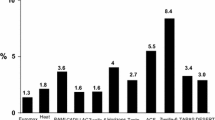Abstract
Primary percutaneous coronary intervention (PCI) with adjunctive glycoprotein (GP) IIb/IIIa receptor inhibitor therapy administered in the cardiac catheterization laboratory is the optimal reperfusion strategy for patients with ST-elevation myocardial infarction. Most available data regarding these agents are from trials comparing abciximab to placebo alone. Noninferiority trials comparing small-molecule GP IIb/IIIa receptor inhibitors, such as tirofiban and eptifibatide with abciximab, have used markers for myocardial reperfusion as primary end points but are underpowered to detect significant differences in hard clinical outcomes. Such a trial would need to enroll a very large number of patients and thus make it practically impossible to perform. Registry data reveal that most patients undergoing primary PCI are treated with small-molecule GP IIb/IIIa receptor inhibitors in clinical practice, and no observed difference is observed in safety and efficacy when compared with patients treated with abciximab therapy.
Similar content being viewed by others
References and Recommended Reading
Antman EM, Anbe DT, Armstrong PW, et al.: ACC/AHA guidelines for the management of patients with ST-elevation myocardial infarction. Circulation 2004, 110:e82–e292.
Gawaz M, Neumann FJ, Ott I, et al.: Platelet function in acute myocardial infarction treated with direct angioplasty. Circulation 1996, 93:229–237.
Smith SC, Feldman TE, Hirshfeld JW, et al.: ACC/AHA/SCAI 2005 Guideline Update for Percutaneous Coronary Intervention—summary article: a report of the American College of Cardiology/American Heart Association Task Force on Practice Guidelines (ACC/AHA/SCAI Writing Committee to Update the 2001 Guidelines for Percutaneous Coronary Intervention). Circulation 2006, 113:156–175.
Bhatt DL, Topol EJ: Current role of platelet glycoprotein IIb/IIIa inhibitors in acute coronary syndromes. JAMA 2000, 284:1549–1558.
Schrör K, Weber AA: Comparative pharmacology of GP IIb/IIIa antagonists. J Thromb Thrombolysis 2003, 15:71–80.
Brener SJ, Barr LA, Burchenal JE, et al.: Randomized, placebo-controlled trial of platelet glycoprotein IIb/IIIa blockade with primary angioplasty for acute myocardial infarction. ReoPro and Primary PTCA Organization and Randomized Trial (RAPPORT) Investigators. Circulation 1998, 98:734–741.
Montalescot G, Barragan P, Wittenberg O, et al.: Platelet glycoprotein IIb/IIIa inhibition with coronary stenting for acute myocardial infarction. N Engl J Med 2001, 344:1895–1903.
Neumann FJ, Kastrati A, Schmitt C, et al.: Effect of glycoprotein IIb/IIIa receptor blockade with abciximab on clinical and angiographic restenosis rate after the placement of coronary stents following acute myocardial infarction. J Am Coll Cardiol 2000, 35:915–921.
Stone GW, Grines CL, Cox DA, et al.: Comparison of angioplasty with stenting, with or without abciximab, in acute myocardial infarction. N Engl J Med 2002, 346:957–966.
Topol EJ, Neumann FJ, Montalescot G: A preferred reperfusion strategy for acute myocardial infarction. J Am Coll Cardiol 2003, 42:1886–1889.
Antoniucci D, Rodriguez A, Hempel A, et al.: A randomized trial comparing primary infarct artery stenting with or without abciximab in acute myocardial infarction. J Am Coll Cardiol 2003, 42:1879–1885.
Antoniucci D, Migliorini A, Parodi G, et al.: Abciximab-supported infarct artery stent implantation for acute myocardial infarction and long-term survival: a prospective, multicenter, randomized trial comparing infarct artery stenting plus abciximab with stenting alone. Circulation 2004, 109:1704–1706.
Gurm HS, Smith DE, Collins JS, et al.: The relative safety and efficacy of abciximab and eptifibatide in patients under-going primary percutaneous coronary intervention: insights from a large regional registry of contemporary percutaneous coronary intervention. J Am Coll Cardiol 2008, 51:529–535.
Moliterno DJ, Ziada KM: The safety and efficacy of glycoprotein IIb/IIIa inhibitors for primary angioplasty: more options to choose and more time to decide. J Am Coll Cardiol 2008, 51:536–537.
Montalescot G, Antoniucci D, Kastrati A, et al.: Abciximab in primary coronary stenting of ST-elevation myocardial infarction: a European meta-analysis on individual patients’ data with long-term follow-up. Eur Heart J 2007, 28:443–449.
Svilaas T, Vlaar PJ, van der Horst IC, et al.: Thrombus aspiration during primary percutaneous coronary intervention. N Engl J Med 2008, 358:557–567.
Danzi GB, Sesana M, Capuano C, et al.: Comparison in patients having primary coronary angioplasty of abciximab versus tirofiban on recovery of left ventricular function. Am J Cardiol 2004, 94:35–39.
Valgimigli M, Campo G, Percoco G, et al.: Comparison of angioplasty with infusion of tirofiban or abciximab and with implantation of sirolimus-eluting or uncoated stents for acute myocardial infarction: the MULTISTRATEGY randomized trial. JAMA 2008, 299:1788–1799.
Zeymer U: Eptifibatide versus abciximab in primary PCI for acute ST elevation myocardial infarction. Late-breaking clinical trial presented at the American Heart Association’s Scientific Sessions. Orlando, FL; November 4–7, 2007.
Raveendran G, Ting HH, Best PJ, et al.: Eptifibatide vs abciximab as adjunctive therapy during primary percutaneous coronary intervention for acute myocardial infarction. Mayo Clinic Proc 2007, 82:196–202.
Midei MG, Coombs VJ, Lowry DR, et al.: Clinical outcomes comparing eptifibatide and abciximab in ST elevation acute myocardial infarction patients undergoing percutaneous coronary interventions. Cardiology 2007, 107:172–177.
Beygui F, Montalescot G: The use of GP IIb/IIIa inhibitors into new perspectives: pre-catheterization laboratory administration. Eur Heart J Suppl 2005, 7(Suppl I):I10–I14.
Montalescot G, Borentain M, Payot L, et al.: Early vs late administration of glycoprotein IIb/IIIa inhibitors in primary percutaneous coronary intervention of acute ST-segment elevation myocardial infarction: a meta-analysis. JAMA 2004, 292:362–366.
Ellis SG, Tendera M, de Belder MA, et al.: Facilitated PCI in patients with ST-elevation myocardial infarction. N Engl J Med 2008, 358:2205–2217.
Author information
Authors and Affiliations
Corresponding author
Rights and permissions
About this article
Cite this article
Tamhane, U.U., Gurm, H.S. GP IIb/IIIa inhibitors during primary percutaneous coronary intervention for STEMI: New trial and registry data. Curr Cardiol Rep 10, 424–430 (2008). https://doi.org/10.1007/s11886-008-0066-5
Published:
Issue Date:
DOI: https://doi.org/10.1007/s11886-008-0066-5




